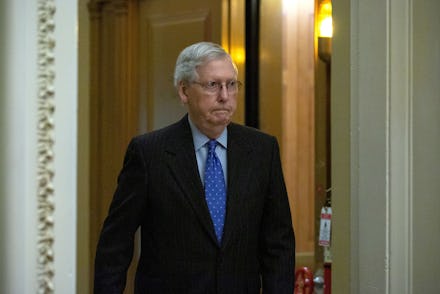While Trump pushes to "open up" the economy, lawmakers are hoping to work remotely

While President Trump pushes for the economy to be "opened up" by Easter, Republican senators are seeking to isolate themselves. "I totally support the idea of remote voting so the Senate can continue to operate during this crisis. We should make this change before the Senate leaves town," South Carolina Sen. Lindsey Graham, one of Trump's fiercest allies on Capitol Hill, tweeted Monday. Last week, meanwhile, Republican Sen. Rob Portman (Ohio) introduced a resolution alongside Democratic Sen. Dick Durbin (Ill.) to allow for remote voting for up to 30 days. The measure could be extended for a longer period of time after that if supported by a three-fifths majority in the Senate.
The pressure to allow remote voting is building after Republican Sen. Rand Paul (Ky.) announced Sunday that he'd tested positive for coronavirus, which directly led two other Republican senators to self-quarantine, per The New York Times. Two representatives in the House have also tested positive for the virus; one, Utah Rep. Ben McAdams (D), was hospitalized.
The quarantines exposed how vulnerable the Senate is to infectious disease. Many members are in their 70s and 80s, and lawmakers' duties often including meeting in close quarters or otherwise interacting with scores of people. Politically, coronavirus in Congress poses a problem too — with several members of their caucus self-quarantining, Republicans found their 53-47 majority suddenly reduced to 48-47, and they were unable to keep Democrats from blocking passage of a nearly $2 trillion stimulus bill; Democrats wanted to enshrine more worker protections in the legislations. If any more Republicans need to self-quarantine, they would effectively lose their majority.
As the calls for remote voting grow louder, it's unclear whether the effort will be able to garner sufficient momentum. Last week, Senate Majority Leader Mitch McConnell argued against the rule change, saying, "We will deal with the social distancing issue without fundamentally changing Senate rules." The only change that’s hit the Senate thus far is a procedural shift, allowing longer times for voting so that fewer senators have to be physically present in the chamber for each vote.
In the House, Democratic Reps. Katie Porter (Calif.) and Eric Swalwell (Calif.) have joined Republican Rep. Van Taylor (Texas) in writing a letter to House Speaker Nancy Pelosi to ask for remote voting. Their request received nearly 70 signatures from fellow members.
“Congress should be no exception to adapting to this crisis,” the letter says. “The House must adopt remote voting both to protect public health and to allow us to be the voices of our constituents.”
After Pelosi requested research into the issue, the House Rules Committee issued a memo regarding possible changes. While the committee didn’t endorse remote voting, it did present the possibility of proxy voting, in which members could vote on behalf of other members, reducing the number of legislators required to be present.
The justified bipartisan alarm about continuing to share physical space contrasts with the Trump administration’s ongoing efforts to minimize the necessity of social distancing. Trump has signaled that he plans to reopen the economy for business within weeks, despite the urging of medical professionals and advisers. While some in his party have disagreed with this notion, including Graham, others have endorsed it — and almost none would publicly disagree with the White House anyway.
If that happens, we will see if Republicans in the legislature follow the path blazed by their colleagues Sens. Kelly Loeffler (Ga.) and Richard Burr (N.C.), who dumped stock while minimizing the coronavirus threat — do as I say, not as I do.